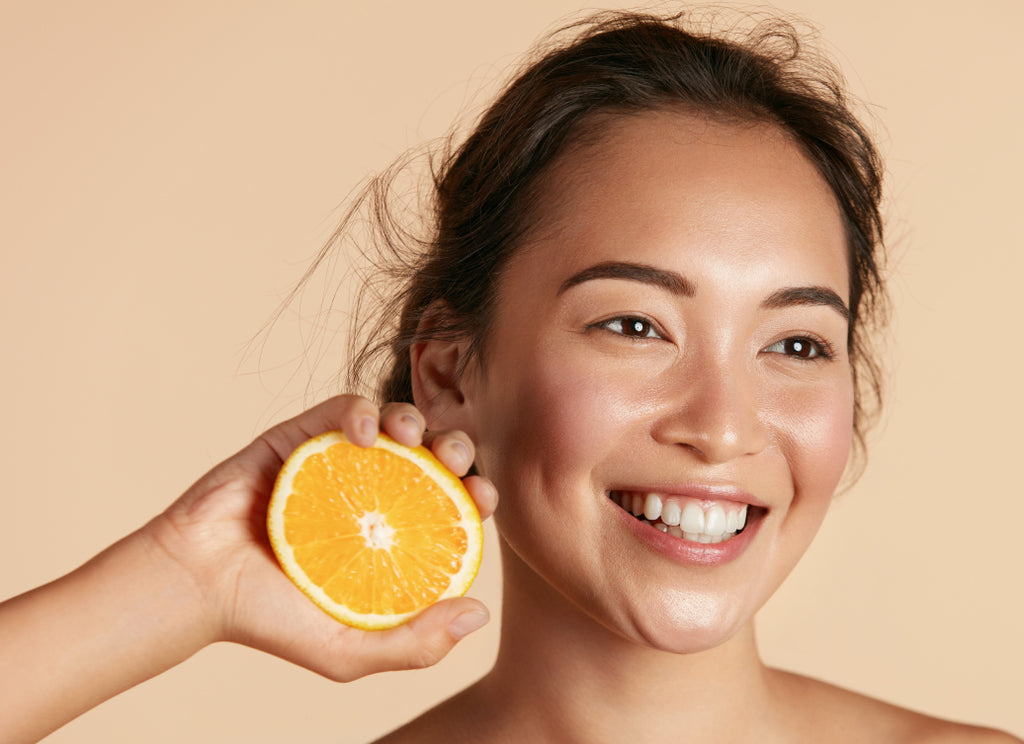
There are so many different remedies for fading hyperpigmentation that it can be hard to tell which might actually be effective. We look at whether vitamin C could be a contender!
What is hyperpigmentation?
Hyperpigmentation is the result of excess pigment particles (known as melanocytes) being deposited deep in the lowest layers of skin. This can happen as a result of trauma, inflammation or other damage to the skin. The discolouration, which can appear in spots, patches or blotchy skin tone, can persist for many years, and is sometimes permanent.
It is more common and more obvious on naturally more melanated skin of colour, and is often the result of chronic eczema or acne breakouts, as well sun exposure, melasma in pregnancy and liver spots as we age.
Although areas of hyperpigmentation aren’t dangerous or detrimental to health, they can make sufferers self-conscious or distressed; understandably, many people who have hyperpigmentation want to find ways to fade it.
Why might vitamin C help?
Vitamin C can play an important part in managing hyperpigmentation, both as a preventative measure and a way of caring for skin that’s already affected.
So what’s so special about vitamin C? Well, it’s an absolutely vital nutrient for the skin, playing a key role in building and maintaining the skin’s defences, and acting to combat damage and promote healing.
- It’s an antioxidant, helping to combat the free radicals that contribute towards skin damage
- It protects against UV-induced skin pigmentation
- It’s a natural anti-inflammatory, useful to calm the inflammation that can cause hyperpigmentation
- It inhibits an enzyme called tyrosinase which regulates melanin production
- It can decrease melanin synthesis
The upshot of all this good work done by vitamin C is that it’s a really useful soldier in the fight against hyperpigmentation, both in preventing new damage, protecting skin already affected, and actually actively working to fade hyperpigmented areas.
How can I take vitamin C for hyperpigmentation?
There are two ways of getting vitamin C to your skin:
- via your diet
- via your skincare
The diet bit is probably easy enough; you’re very likely to already be getting sufficient dietary vitamin C, though it’s worth knowing that you don’t store it in your body, so need a regular intake! Foods rich in vitamin C include red and orange fruit and veg such as oranges, peppers, strawberries, broccoli, brussels sprouts and potatoes.
The exciting news is that topical application of vitamin C is a much more efficient way of getting the nutrient to your skin than through your diet! So you can apply a vitamin C-rich cream or oil to your skin and reap the rewards with healthier, more resilient skin.
You can spot synthesised, high potency vitamin C listed in ingredients as ascorbic acid, ascorbate or ascorbyl.
Going the natural route
Although it’s been thought that vitamin C is only water-soluble and not soluble in oils, in fact a few select plant and seed oils do have the capacity to carry the vitamin! So if you want to get vitamin C onto your hyperpigmented skin with natural skincare, then you need to seek out products containing one or more of the following oils:
- rosehip
- sea buckthorn
- calendula
- marula
- carrot
Vitamin C in Balmonds products
We use several of these nutritious oils in our products! For improving the appearance of hyperpigmented skin we’d recommend our Rosehip Scar Oil, which contains a good proportion of both the extraordinarily regenerative rosehip oil and macerated calendula oil; or if you prefer a cream, try our Intensive Hand Cream with sea buckthorn oil (a super food, incredibly rich in all sorts of nutrients for skin) and more calendula.
Recommended products:
Balmonds Rosehip Scar Oil with rosehip, lavender & chamomile (£18.99 for 50ml)
Balmonds Intensive Hand Cream with sea buckthorn berry & hemp (from £10.99 for 50ml)
